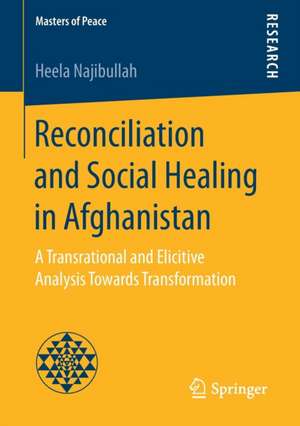Reconciliation and Social Healing in Afghanistan: A Transrational and Elicitive Analysis Towards Transformation: Masters of Peace
Autor Heela Najibullahen Limba Engleză Paperback – 19 ian 2017
Din seria Masters of Peace
-
 Preț: 410.77 lei
Preț: 410.77 lei -
 Preț: 377.18 lei
Preț: 377.18 lei -
 Preț: 378.54 lei
Preț: 378.54 lei - 15%
 Preț: 465.98 lei
Preț: 465.98 lei -
 Preț: 312.30 lei
Preț: 312.30 lei -
 Preț: 378.71 lei
Preț: 378.71 lei -
 Preț: 377.95 lei
Preț: 377.95 lei -
 Preț: 302.45 lei
Preț: 302.45 lei -
 Preț: 119.30 lei
Preț: 119.30 lei -
 Preț: 228.00 lei
Preț: 228.00 lei -
 Preț: 230.63 lei
Preț: 230.63 lei -
 Preț: 303.86 lei
Preț: 303.86 lei
Preț: 522.56 lei
Preț vechi: 614.79 lei
-15% Nou
Puncte Express: 784
Preț estimativ în valută:
99.100€ • 105.15$ • 82.62£
99.100€ • 105.15$ • 82.62£
Carte tipărită la comandă
Livrare economică 17 aprilie-01 mai
Preluare comenzi: 021 569.72.76
Specificații
ISBN-13: 9783658169305
ISBN-10: 3658169303
Pagini: 213
Ilustrații: XVIII, 213 p. 9 illus.
Dimensiuni: 148 x 210 x 12 mm
Greutate: 0.28 kg
Ediția:1st ed. 2017
Editura: Springer Fachmedien Wiesbaden
Colecția Springer
Seria Masters of Peace
Locul publicării:Wiesbaden, Germany
ISBN-10: 3658169303
Pagini: 213
Ilustrații: XVIII, 213 p. 9 illus.
Dimensiuni: 148 x 210 x 12 mm
Greutate: 0.28 kg
Ediția:1st ed. 2017
Editura: Springer Fachmedien Wiesbaden
Colecția Springer
Seria Masters of Peace
Locul publicării:Wiesbaden, Germany
Cuprins
Contextualization of Afghan Politics.- Analysis of Reconciliation through the Pyramid of Peace Actors.- National Reconciliation: 1986–1992.- Afghan Peace and Reintegration Program.- Social Healing: The Missing Component.- Geneva Accords 1988 and UN Five Point Peace Plan For Afghanistan.
Notă biografică
Heela Najibullah is a peace researcher from the MA program in, Peace, Development, Security and International Conflict Transformation at the University of Innsbruck, a humanitarian worker in the field of forced migration who intends to start her PhD project soon.
Textul de pe ultima copertă
Heela Najibullah analyzes the Afghan reconciliation processes through the lenses of transrational peace philosophy and Elicitive Conflict Transformation. The research highlights two Afghan governments reconciliation processes in 1986 and 2010 and underlines the political events that shaped the 1986 National Reconciliation Policy, drawing lessons for future processes. The author points out the historical and geopolitical patterns indicating regional and global stakeholders involvement in Afghan politics. Social healing through a middle-out approach is the missing and yet crucial component to achieve sustainable reconciliation in Afghanistan.
Contents
- Contextualization of Afghan Politics
- Analysis of Reconciliation through the Pyramid of Peace Actors
- National Reconciliation: 1986–1992
- Afghan Peace and Reintegration Program
- Social Healing: The Missing Component
- Geneva Accords 1988 and UN Five Point Peace Plan For Afghanistan
Target Group
- Lecturers and students of political science, especially in the field of peacebuilding, reconciliation and conflict transformation
- Practitioners and researchers in the field of Elicitive Conflict Transformation, Asian studies, Afghan diaspora, policy makers, historians, UN Analysts
The Author
Heela Najibullah is a peace researcher from the MA program in Peace, Development, Security and International Conflict Transformation at the University of Innsbruck, a humanitarian worker in the field of forced migration who intends to start her PhD project soon.
Caracteristici
Study in the Field of Peacebuilding, Reconciliation and Conflict Transformation Includes supplementary material: sn.pub/extras
